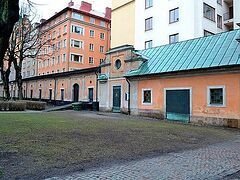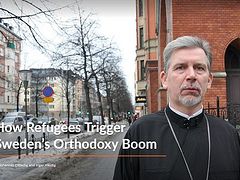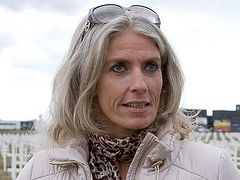Today our journey across the islands of Orthodox life around the globe has taken us to Sweden. We spoke with Archpriest Vitaly Babushin, rector of the Church of St. Sergius of Radonezh in Stockholm, about the role of St. Sergius in his life, the Swedish military who are embarrassed by their own flag, a high culture of everyday life in Scandinavia, responsible parishioners, the hero Mikael who built an Orthodox church in the north of the country, conservative Lutherans, the authority of the Russian Church among the locals, lessons of the priestly ministry, and the lightness of the burden of Christ for believers.
 Archpriest Vitaly Babushin with the parishioners
Archpriest Vitaly Babushin with the parishioners
—Fr. Vitaly, your life is very interesting. You studied to be a physician and became an Orthodox priest, a healer of human souls. You served in the Church of St. Sergius in the Noginsk district of the Moscow Region from 2001 till 2010, and suddenly you were sent to Sweden. Perhaps, before your assignment to the Stockholm parish, you were interested in the culture of Sweden or other Scandinavian countries, studied the language, or visited Sweden? In this case, can we say that your thoughts came to fruition in some way? Or was it completely unexpected?
—When it comes to coincidences, as religious people we understand that nothing happens in our lives by chance. All coincidences are intertwined, against our will and our assessments, into some kind of regularity. My transfer to Sweden coincided with my ministry in the Moscow Region. I was the rector of a parish in the Noginsk district. And for me it came as a complete surprise. Yes, this path wasn’t something I had chosen, but the Lord pointed out this path, and the situation developed independently from my life priorities and desires.
I didn’t think about Sweden, I didn’t think about life abroad at all... It just happened that way! I was recommended as a priest by my friends who also served abroad, and the recommendation providentially turned out to be successful. They met with me, talked and offered a transfer. I asked the bishop for his blessing. And it all worked out.
—You were transferred from one St. Sergius parish to another St. Sergius parish. It seems to have been the direct backing of St. Sergius! Was there a story connected with that?
—When I learned that I would be assigned to serve at St. Sergius parish in Stockholm, I of course was very encouraged. Because the importance of St. Sergius for any Russian cannot be overestimated, this served as a special sign for us. It was a great consolation and even a reward to be the rector of a church in a village near Moscow, and then unexpectedly be transferred to another country where Orthodox people also have St. Sergius as their patron. My family and I were glad that there was nothing human in these changes—they were purely spiritual, providential in nature. If we can work for the spiritual benefit of our compatriots who ended up in Sweden, far from their homeland, and somehow be useful to them, then the will of God and St. Sergius is present.
—In one of your interviews you called Sweden a post-Christian country, and your interview entitled, “We Walk Here in the Land of Sodom and Gomorrah”, exploded in the Orthodox internet. Is it really so bad there?
—Our first impressions indeed were harsh and categorical. There was a feeling that the world of Europe, of the Scandinavian countries was a post-Christian world. Well, the loss of Christian traditions and moral values was so obvious that it prompted me to describe this life as Sodom and Gomorrah.
But now, some time later, I would not speak in those Biblical words and wouldn’t be so categorical, because not all of society is post-Christian; but, on the other hand, nothing has changed on a national scale. Indeed, we live in the post-Christian European reality, in a world where everything related to Christianity is ignored or forgotten in favor of some new, and often openly sinful, tendencies. Not so long ago there was a report about a small military contingent of the Swedish Army in Afghanistan. Swedish soldiers complained that they were perceived as Christian knights, since the national flag fluttered over their armored vehicles. As we know, the Swedish flag features a yellow cross on a blue background. The cross is a symbol of Christianity. But most Swedish citizens are no longer affiliated with Christianity. When the Swedish brigade patrols Afghan villages, its fighters are somewhat displeased that the cross is flying over them.
The cross, according to the author of the report, is not the symbol that represents modern Sweden. There are modern trends in Swedish society which aim to find and formulate new symbols to be adopted at a state level. It’s quite a non-religious country today. However, there are traditions and monuments of Christian culture here, which are still visited by people of the old school.
—On arriving in Sweden, did you and your family experience culture shock? Perhaps you are still experiencing it? If so, could you give some examples? The most vivid memories are probably from the first months.
—It wasn’t culture shock, but more of a personal impression, in contrast to our Russian, Slavic, Orthodox mentality and theirs—what’s characteristic of people of the north, Scandinavians, Protestants. It is no secret that the modern Protestant countries of Europe (including Sweden) consist of people who are quite civilized. Everyday life there is highly civilized. The streets are clean, so are the washrooms. This is what stands out for someone who came from Russia, and not from a big city. It leaves a good impression. Why do we not live like that? There is no one stopping us from arranging the spaces we live in as we see fit.
On the other hand, people in Sweden have been living like this for many years. And you wonder: why is it like that here, but not in other places? Perhaps it has to do with the spiritual, but in no small way it has to do with Swedish Protestantism.
There is no culture shock that could limit our ability to communicate with Swedes. Orthodox and Protestant traditions are on the same religious plane. I can observe that a believer here is always more easily understood by a fellow believer than by an atheist. When you meet people who live in the space of a former Christian country, they are still Christians in their way of life. The modern trends of the last twenty or thirty years are leading people away from Christianity and religion, making them focus on everyday life rather than the things we focus on. On coming to some Islamic country you feel more at home than in modern atheistic Scandinavia.
— Let's talk about something positive: the parish of St. Sergius. In 2017, the community celebrated its twentieth anniversary. How many parishioners do you have today? Are most of them Russians, emigrants from the former USSR (as part of the first or the last waves), or Swedes?
—In Stockholm, our central parish of the Moscow Patriarchate has around 1,000 registered members. This is a fairly large parish, but, in practice, about 200 people usually attend the church.
We mainly have people from Ukraine. These are recent immigrants who arrived between ten and twenty years ago. They speak Russian. In the church we represent one Christian, cultural, liturgical community. All of us are united in our faith, our culture of language and worship. But most of our parishioners are Ukrainians, although there are also Belarusians and people from the Caucasus. There are some Orthodox Swedes, too. And, of course, Russians from Russia.
—What is the motivation of those who moved to Sweden in the recent years?
—This may happen because of an employment contract, the desire to extend it, stay, take one’s family or get married here. But most of our parishioners developed contacts in advance, married someone from Sweden and moved here in search of a better life.
—Can you tell us more about your parish life? Do your parishioners take an active part in taking care of the church, making decisions, sharing responsibilities for the parish? Or does most of the administrative and financial burden fall on the priest’s shoulders?
—In light of his pastoral duties, the priest cannot deal with issues related to the search for premises for worship, fundraising for maintenance, or one-off costs. In Stockholm, the parishioners play an essential part. We have an active group of parishioners that helps the rector in various aspects of parish life. It acts as an advisory body as well as the parish council. For a Russian village, the parish council is not so relevant, since everything is decided by the priest and his connections, contacts, charisma in communication with the secular authorities. Here, the parishioners’ initiative matters.
When the Swedish authorities contact us on a particular issue, say, to inquire about our life, they first of all ask about the participation of people in parish life. And their participation is very direct. We record the decisions of our parish assembly and the parish council. This is a deliberative function when the most active part of the parish works; the next step is to submit some decisions for discussion at the (annual) general assembly. It is there that we make crucial decisions together.
—Who is the head of the community in the eyes of the Swedish law and the State?
—The assembly. It makes decisions. According to its statutes, its chairman is the rector. But in fact the role of the assembly and democratic principles in the life of religious communities is very important.
—You said there are 1,000 registered members of the parish. Is it mandatory for parishioners to be registered?
—Yes, there is a questionnaire that a person fills out, entering his request to be included in the parish and leaving his personal data. A registered parishioner must confess the Orthodox faith, live in Sweden permanently and be ready to join the parish life through prayer and membership fees. People become members of the Church consciously by choosing our parish.
—Are membership fees voluntary, or is a regular fixed amount taken from income for the denomination a believer belongs to?
 —Fees and the membership itself imply certain responsibilities. If I get acquainted with the statutes of an organization, and one of its requirements is the payment of fees, I must understand my responsibility before the organization and outline a plan for myself.
—Fees and the membership itself imply certain responsibilities. If I get acquainted with the statutes of an organization, and one of its requirements is the payment of fees, I must understand my responsibility before the organization and outline a plan for myself.
Every newborn in Sweden automatically becomes a member of the Church of Sweden. At least this was the case until recently. Now these trends are fading away due to the waves of emigrants from Islamic countries. People are asked if they want to be members of the Church of Sweden. Previously, this question wasn’t even asked, and they were automatically registered as members of the Church of Sweden. As children they would be brought to church to be baptized, and they would later pay a tax there.
All donations in our church are of a recommended nature. If, however, you choose to become an official member of a religious organization and you know that payment of membership fees confirms your membership, you consent and add your signature. Our rules are no different from those of other religious organizations in Sweden. The only difference is that our internal statutes also presuppose that each member confesses the Orthodox faith.
Each year the rector and his assistants report to the parish council and the assembly on how our budget was formed, what funds went to the parish, how many members made donations and who didn’t. We solve all these problems together with all the parishioners.
—Does your parish face problems with self-sufficiency or attracting funding today?
—We receive no funding. We solve all our current issues ourselves: rent payments, maintenance of the premises, paying the priest’s salaries. I don’t have a secular job, but our other priests in Sweden do, including Serbian, Georgian, Romanian clergy. Our situation in Stockholm allows me to engage only in pastoral work. But nobody knows what will happen next. It’s possible that I’ll have to find work in a hospital according to my education. As long as a charitable foundation helps us, we are doing well. There is no reason to be discouraged, though—God is merciful.
Serious projects such as organizing major events involving participants from Russia cost a lot of money. The parish can’t afford this.
— Has the St. Sergius parish resolved the issue with the premises?
 The Church of the Kazan icon in Västerås —In 2020 we moved to a new building—the Lord sent us people, some Protestant Swedes with whom we have become good friends. They agreed to share their church building with us. We use it together with the Protestant community.
The Church of the Kazan icon in Västerås —In 2020 we moved to a new building—the Lord sent us people, some Protestant Swedes with whom we have become good friends. They agreed to share their church building with us. We use it together with the Protestant community.
—Did the Church of Sweden step forward?
—It should be said that it is not the Church of Sweden, but its branch—the Free Diocese of the Church of the Swedish Tradition. These are Lutherans who have preserved the old conservative traditions. Outwardly, they are similar to Catholics in their ceremonies. It’s easier to negotiate with them. They feel the spiritual reality differently from the Church of Sweden, they have no women priests and don’t easily rewrite or “correct” Holy Scripture to please the world. We have found a common language with them. We must commend these people—they are kind, pious, true European Christians.
To be continued.






